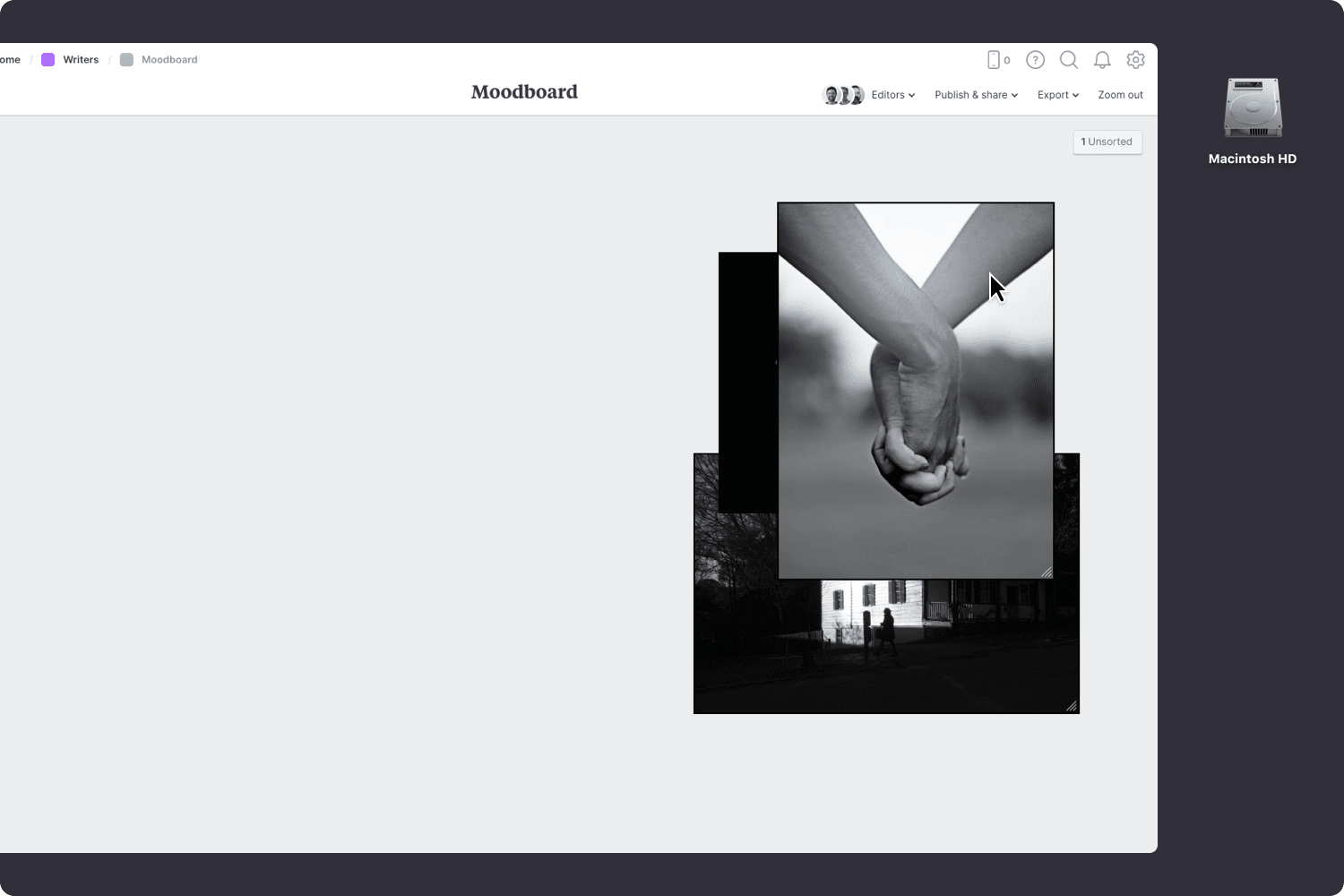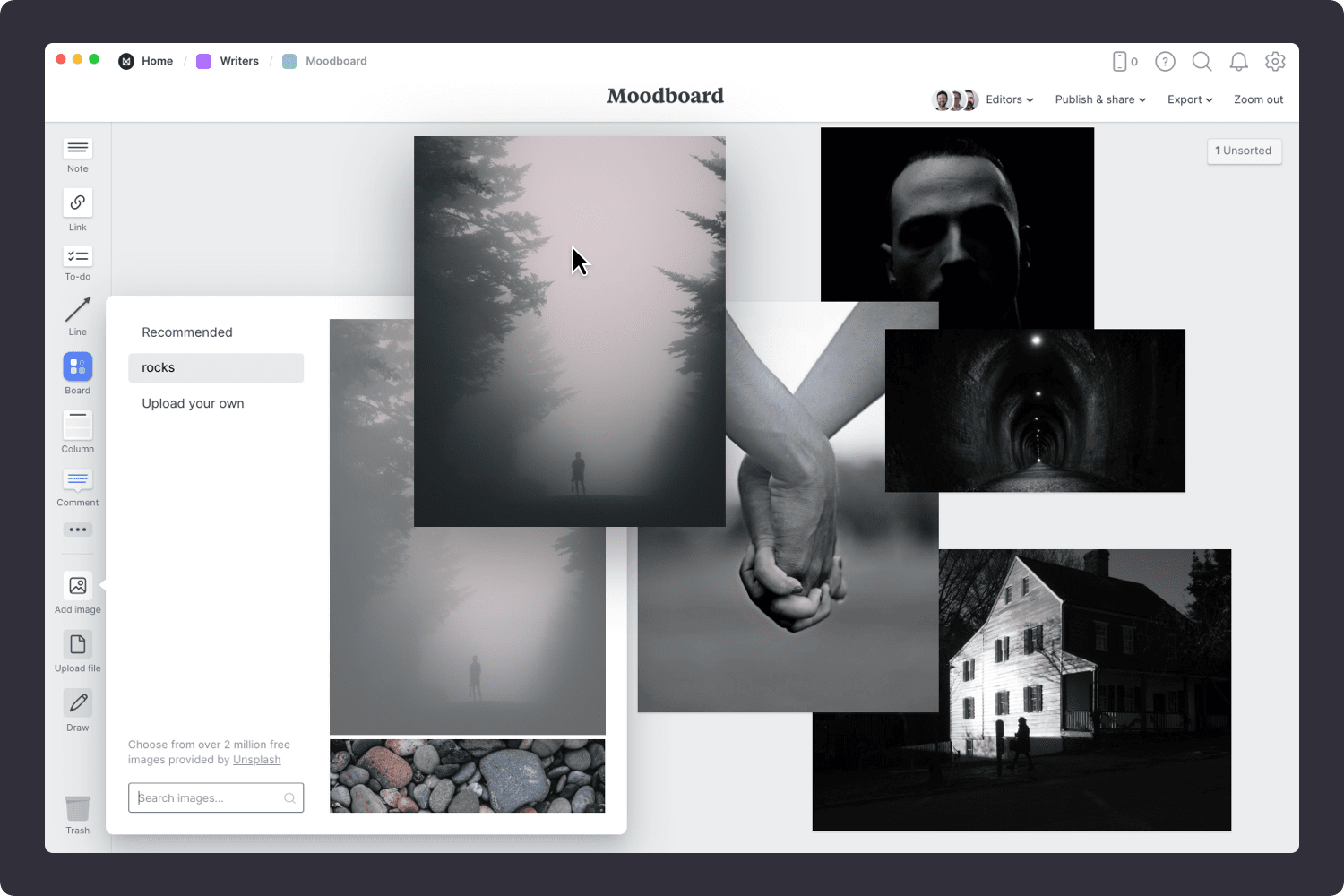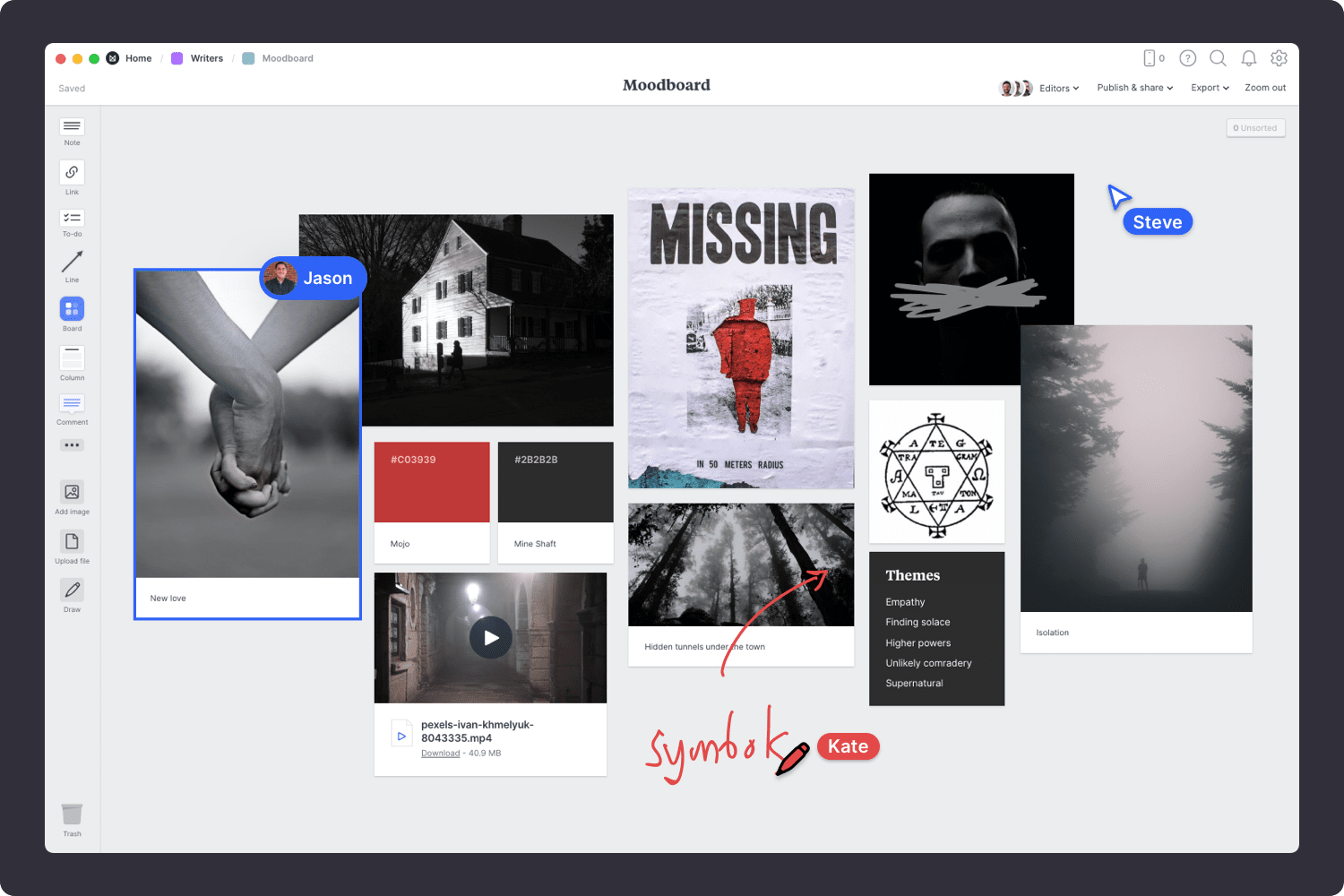Start your novel moodboard
Get started for free with Milanote's beautiful moodboard templates.
Start your moodboardSign up for free with no time limit
A moodboard (or "inspiration board") is the perfect way to save inspiration and generate new ideas for your story. It's a technique used by designers, filmmakers and photographers but works just as well for creative writing.
Moodboards have come a long way since the days of attaching printouts to physical boards or creating static PDFs. Online moodboards can include video, images, links and color—unlocking a whole new world of creative possibilities.
In this guide, you'll learn the modern approach to creating a moodboard for a novel using Milanote. Remember, the creative process is non-linear, so you may find yourself moving back and forth between the steps as you go.
Moodboards can help you visualize any aspect of your story. You might want to focus on figuring out how a character or location could look. Or they could be centred around the era or the emotion you want to capture. You can create a moodboard for each of these separately or mix them all into one board. There are no strict rules.
Remember, a moodboard is all about exploration, so don't get too attached to a particular direction. The process of creating a moodboard will spark new ideas and directions you might not have considered.

Create a new board for each moodboard direction.
Drag a board out from the toolbar. Give it a name, then double click to open it.
Save time with a moodboard template.
Each new board gives you the options to start with a beautiful template.
Creativity often responds well to some constraints or limitations. Picking a keyword, theme, color or style can be a great way to give some direction to your moodboard.
Now that you've established the purpose of your moodboard, add any existing material you have—this could include images you've saved to your computer as inspiration. These might not make it into the final moodboard, but they're still a great place to start.

Drag files from your computer.
Click the "Upload file" button or just drag a file onto your board. You can add images, logos, documents, videos, audio and much more.
The imagery you bring into your moodboard is what helps you express the feel of your story. Images can help you define things like tone, emotion, or a feeling you might be struggling to capture as you're writing.
You can start by saving visual references from around the web. There are lots of fantastic sites where you can find great visual inspiration for free, like Google Images, Instagram or Pinterest. Don't worry about organizing the images just yet, that step will come later.

Use the built-in image library.
Search over 3 million beautiful photos powered by Pexels then drag images straight onto your board.
Install the Milanote Web Clipper
Save images from other websites straight to your board.
Roll over an image (or highlight text), click Save, then choose the destination in Milanote. Return to your board and find the content in the "Unsorted" column on the right.
Adding descriptions of sound is a great technique to transport your reader to another place. Think about the sound of twigs snapping beneath your feet as you walk through the forest, or the background noise of the city while you're trying to sleep. Capturing and studying these sounds will help you describe them in a rich, unique, and believable way. Save video or audio from Youtube and Vimeo to get inspired.

Embed Youtube videos or audio in a board.
Copy the share link from Youtube, Vimeo, Soundcloud or many other services. Drag a link card onto your board, paste your link and press enter.
Color can be a great way to express a particular feel, personality or energy. As painter Johannes Itten said, “Color is life.” Tools like Kuler can be a great starting point for finding colors that work well together. Another trick is to pick colors directly from the images and photos you've added to the board.

Add a color swatch to a board.
Drag a Note card onto your board, enter your colour #HEX code and press enter. E.g. Teal looks like this: #008080
Step away—the best creative thinking often happens in the idle moments where we allow our mind to wander. So make space, be open to new ideas and connections and embrace the mess.
Once you have all your inspiration in one place, the next step is to arrange your ideas to create the perfect composition. Try combining different elements together. This is where you'll start to see new ideas appear. Perhaps the combination of two unrelated images will trigger an exciting new storyline.

Resize your images to add hierarchy.
Drag the corner of an image to resize it. Double-click the corner to return it to its original size.
Crop images.
Double-click an image and press edit to crop or rotate it.
You never know where or when you'll find inspiration—it could strike you at 2am, or as you're strolling the isles of the grocery store. So make sure you have an easy way to capture new ideas on the go.
As creative director Grace Coddington said, "Always keep your eyes open. Keep watching. Because whatever you see can inspire you."

Download the Milanote mobile app
Save photos from your phone to your Moodboard.
Shoot or upload photos directly to your board. When you return to a bigger screen you'll find them in the "Unsorted" column of the board.
It always helps to bounce ideas off other people. As writer Louisa May Alcott said, "It takes two flints to make a fire." A digital moodboard is especially useful for this step as you can easily connect and collaborate online. Invite a writing partner to add a fresh perspective to your moodboard.

Invite someone else to edit to your board.
Open the "Editors" menu from the title bar of your board. Add email addresses of the people you'd like to collaborate with—they'll receive an invitation via email.
Collaborate in real time.
When multiple people on your team edit a board at once you'll see their updates appear in real-time.
Now that your moodboard is complete, you have a powerful visual reference for your story and hopefully a bunch of new ideas. Remember, you can create multiple moodboards to explore different aspects of your story at any time. Use the template below to create a new moodboard in minutes or read our full guide on how to plan a novel.
